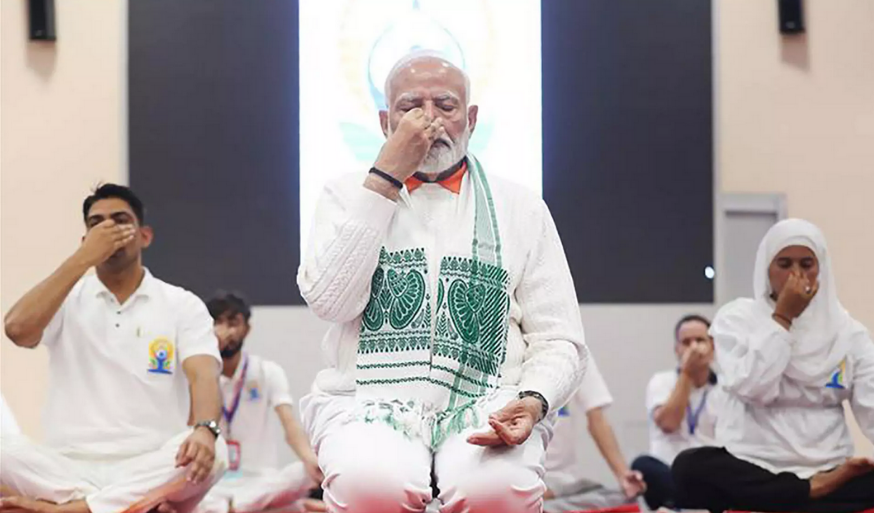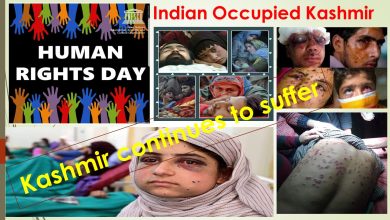
 Prime Minister Narendra Modi’s recent visit to Srinagar, ostensibly aimed at heralding a new era of development and stability in Jammu and Kashmir, has once again spotlighted the glaring inconsistencies in his government’s approach to the region.
Prime Minister Narendra Modi’s recent visit to Srinagar, ostensibly aimed at heralding a new era of development and stability in Jammu and Kashmir, has once again spotlighted the glaring inconsistencies in his government’s approach to the region.
Modi’s speeches during the visit, imbued with rhetoric, failed to address the core issues faced by the Kashmiri people. Rather than fostering an environment conducive to peace and reconciliation, his statements aggravated existing tensions and further made locals feel like aliens.
Modi’s visit to Srinagar was marked by the inauguration and foundation stone-laying of multiple developmental projects worth more than Rs 3,000 crores. Despite significant developmental initiatives, Modi’s persistent focus has overshadowed any potential for meaningful engagement with the Kashmiri people.
Modi’s approach in Srinagar represents a strategic miscalculation in addressing the larger issue of Kashmir. The multifaceted nature of the Kashmir issue encompasses historical grievances, ethnic identities, political aspirations, and socio-economic disparities.
Modi’s strategy lacks the necessary depth and nuance required for a comprehensive conflict resolution approach, as it reduces the problem to a mere security concern framed around countering terrorism.
In international relations theory, this can be likened to the pitfalls of reductionism, where complex issues are oversimplified, often leading to ineffective or counterproductive policies. A more holistic approach would require addressing the root causes of discontent, engaging with local stakeholders, and integrating diverse perspectives into the peace-building process.
The securitization of the Kashmir issue, where the Indian state frames the region’s challenges primarily through the lens of national security, has been a recurring theme in Modi’s rhetoric.
Modi’s continuous emphasis on Pakistan’s role in fomenting terrorism acts as a strategic diversion from the legitimate political and socio-economic grievances of the Kashmiri people.
This tactic not only reinforces a binary us-versus-them mentality but also legitimizes heavy-handed security measures that further alienate the local population. For example, the emphasis on external threats has historically been used by states to deflect from internal problems, such as in the Cold War era, where the US focused on the Soviet threat to divert attention from domestic civil rights issues.
Shifting focus
Similarly, Modi’s rhetoric shifts the focus from pressing issues such as human rights abuses, political disenfranchisement, and economic marginalization in Kashmir.
The narrative construction neglects the diverse identities and aspirations within Kashmir, perpetuating a sense of disenfranchisement among its people. Constructivist theories in international relations stress the importance of identity and social constructs in shaping political outcomes.
Modi’s approach exacerbates feelings of alienation and disenfranchisement by failing to recognize and address the unique cultural, ethnic, and political identities within Kashmir. For instance, the abrogation of Article 370, which granted special status to Jammu and Kashmir, was seen by many Kashmiris as an assault on their unique identity and autonomy. This move ignored the region’s historical and cultural complexities, leading to widespread resentment and unrest.
The abrogation of Article 370 and the subsequent rhetoric around it can be viewed as an imposition of a monolithic national identity over the pluralistic and contested identities within Kashmir.
Modi’s declaration that “the Constitution of India has finally been adopted by Jammu and Kashmir in the true sense” following the abrogation is a stark reminder of the central government’s unilateral actions that many Kashmiris perceive as a betrayal. This move, while celebrated by some, has been a source of profound discontent and has intensified the sense of alienation among the Kashmiri population.
From a realist perspective, Modi’s approach to Kashmir underscores the central government’s reliance on hard power rather than soft power to maintain control. Modi’s assertion that “the Kashmir Valley is gradually emerging as a major hub of start-ups, skill development, and sports” may be optimistic, but it overlooks the pervasive sense of mistrust and disillusionment towards New Delhi.
This highlights a gap between developmentalist rhetoric and the lived realities of the locals. In international relations, this can be seen as a form of “symbolic politics”, where political leaders use symbols and narratives to create a perception of progress while underlying issues remain unaddressed.
Development initiatives, without accompanying political engagement, risk being perceived as mere instruments of control rather than genuine efforts to improve the lives of the locals.
The realist critique highlights the limitations of relying solely on economic incentives to pacify a region with deep-seated political grievances. Sustainable peace and stability in Kashmir require addressing the power asymmetries and ensuring that the voices of the Kashmiri people are heard and respected.
Diplomatic implications
Modi’s anti-Pakistan rhetoric also has significant diplomatic implications. India risks alienating potential international allies who advocate for a more balanced and sophisticated approach to the Kashmir issue by continuously framing Pakistan as the primary antagonist.
This aligns with the realist perspective in international relations, which emphasizes the importance of balancing power and maintaining alliances. Over-reliance on a hardline stance against Pakistan can lead to diplomatic isolation and weaken India’s position in the international community.
This rhetoric undermines India’s position on the international stage. From a liberal internationalist perspective, a country’s standing is enhanced by its adherence to international norms and its ability to engage in constructive diplomacy.
Advertisement
India risks being perceived as an intransigent actor unwilling to engage in dialogue or adhere to international calls for peaceful conflict resolution by adopting a confrontational stance.
Prime Minister Narendra Modi’s Srinagar visit, rather than paving the way for genuine peace and reconciliation, has only served to add salt to the wounds of a community that continues to feel marginalized and unheard.
It is evident that without addressing the legitimate grievances of the Kashmiri people and shifting focus from externalizing blame to internal resolution, sustainable peace in the region will remain elusive.
(The writer is Head of Research and Human Rights at the Islamabad-based think tank Kashmir Institute of International Relations)








